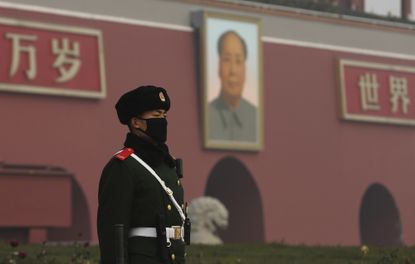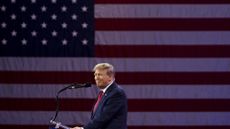China has taken a dark turn
Confronted with an economic crisis, the Chinese government is cracking down — hard

Fearing domestic unrest, Beijing is cracking down on citizens and foreigners alike.
Human rights activists rounded up by the hundreds. Booksellers spirited out of Hong Kong to the mainland in secret. Foreigners reciting forced confessions on national television for the crime of "harming" China, and the most sweeping national security law in recent Chinese history enacted.
China is in the midst of its most severe internal security crackdown in recent memory. The authoritarian country, led by President Xi Jinping, is cracking down on citizens and foreigners alike. But what's driving this crackdown, and could it backfire?
Subscribe to The Week
Escape your echo chamber. Get the facts behind the news, plus analysis from multiple perspectives.

Sign up for The Week's Free Newsletters
From our morning news briefing to a weekly Good News Newsletter, get the best of The Week delivered directly to your inbox.
From our morning news briefing to a weekly Good News Newsletter, get the best of The Week delivered directly to your inbox.
Since July, nearly 250 Chinese human rights lawyers, activists, and their families have been detained, many charged with "subversion of state power." Most were released, but at least 10 remain in detention, without access to counsel or their families.
Foreigners have not been exempt. In December, a French journalist was expelled from the country for writing an article that the Beijng disapproved of. Since October, five Hong Kong booksellers, all tied to a publishing house critical of the Chinese government, have disappeared. One holds British and another Swedish citizenship.
Earlier this month a 35-year old Swedish human rights worker living in Beijing, Peter Dahlin, disappeared only to reappear on Chinese television. Dahlin recited a "confession" apologizing for "hurting the feelings of the Chinese people."
Against all of this is the backdrop of a new security law passed in July that gives the government the authority to dip into even more aspects of Chinese society, including the economy, terrorism, religion, and cybersecurity.
The reason for Dahlin's arrest was explained by Xinhua, China's official news agency, which said Dahlin's organization "instigated the (Chinese) people to confront the government and produce mass incidents."
In modern China, the ruling Communist Party is often said to have an unwritten social contract with the Chinese people. The Party provides financial prosperity and political stability, and in return China's citizens won't challenge its monopoly on power. This has worked out fairly well for the average Chinese citizen, hundreds of millions of which have been lifted out of poverty.
But what happens when the government can no longer provide that level of prosperity and can't fulfill its side of the contract? What happens when China's 1.3 billion people start demanding alternative forms of government?
China is already a hotbed for social unrest. Small-scale demonstrations, sparked by complaints about corruption, government incompetence, pollution, and other public grievances are fairly common. The real fear in Beijing is a faltering economy may trigger social unrest on a greater scale than previously seen, exceeding the government's ability to deal with it.
China oversees the largest internal security apparatus in the world. From the Great Firewall of China to the People's Armed Police, a paramilitary police organization, China spends tens of billions on internal security. China's internal security budget is thought to be even larger than it's external security budget, i.e. the People's Liberation Army.
China needs annual economic growth of at least 7 percent in order to generate continued prosperity and economic opportunity. Still, over the long term this is unsustainable and a slowdown, everyone agrees, is inevitable and even necessary.
And, at least in government figures, the soft landing is happening: China's GDP figures for 2014 were 7.0 percent, 2015 was 6.9 percent and 2016 is predicted to be 6.8 percent. This appears to be the soft economic landing that China experts have been hoping for.
But is it? These numbers are suspiciously consistent, especially for such a large, vibrant economy. More volatility should be expected. At least one research group suggests that China's real GDP growth will be a paltry 2.4 percent. Depending on China's inflation rate, there could actually be negative economic growth.
Outlying economic data supports skepticism. Internal railroad traffic is down 15 percent in two years, and the shipbuilding industry has cooled. Electricity usage in 2015 increased less than 1 percent in China — while the economy was supposed to have grown 6.9 percent. Figures such as these trigger speculation the economy is worse off than the government is letting on.
The concern is the Chinese government is executing a four-pronged strategy to head off, or least prepare for, widespread domestic unrest. First, enact a security law to give harsher measures legitimacy. Second, intimidate human rights and religious activists in China who might lead demonstrations. Third, cook the country's economic books to prevent a real picture of the Chinese economy from leaking out. Fourth, blame foreign interests for interfering in Chinese affairs.
The problem with this strategy is that it is ultimately self-defeating. Economic and security measures meant to benefit the Communist Party and its survival — over the well being of the Chinese people — will be seen for what they are and resented. Manipulation of economic figures will cause the government to lose credibility.
China may be heading for tough times — or not. In either case, the Communist Party seems determined on preparing for the worst case scenario. The question is whether President Xi Jinping and his comrades ultimately have the best interests of the party, or the people, in mind.
Sign up for Today's Best Articles in your inbox
A free daily email with the biggest news stories of the day – and the best features from TheWeek.com
Kyle Mizokami is a freelance writer whose work has appeared in The Daily Beast, TheAtlantic.com, The Diplomat, and The National Interest. He lives in San Francisco.
-
 Why Man United finally lost patience with ten Hag
Why Man United finally lost patience with ten HagTalking Point After another loss United sacked ten Hag in hopes of success in the Champion's League
By The Week UK Published
-
 Who are the markets backing in the US election?
Who are the markets backing in the US election?Talking Point Speculators are piling in on the Trump trade. A Harris victory would come as a surprise
By The Week UK Published
-
 Crossword: November 3, 2024
Crossword: November 3, 2024The Week's daily crossword
By The Week Staff Published
-
 Has the Taliban banned women from speaking?
Has the Taliban banned women from speaking?Today's Big Question 'Rambling' message about 'bizarre' restriction joins series of recent decrees that amount to silencing of Afghanistan's women
By Harriet Marsden, The Week UK Published
-
 Cuba's energy crisis
Cuba's energy crisisThe Explainer Already beset by a host of issues, the island nation is struggling with nationwide blackouts
By Rebekah Evans, The Week UK Published
-
 Putin's fixation with shamans
Putin's fixation with shamansUnder the Radar Secretive Russian leader, said to be fascinated with occult and pagan rituals, allegedly asked for blessing over nuclear weapons
By Harriet Marsden, The Week UK Published
-
 Chimpanzees are dying of human diseases
Chimpanzees are dying of human diseasesUnder the radar Great apes are vulnerable to human pathogens thanks to genetic similarity, increased contact and no immunity
By Harriet Marsden, The Week UK Published
-
 Deaths of Jesse Baird and Luke Davies hang over Sydney's Mardi Gras
Deaths of Jesse Baird and Luke Davies hang over Sydney's Mardi GrasThe Explainer Police officer, the former partner of TV presenter victim, charged with two counts of murder after turning himself in
By Austin Chen, The Week UK Published
-
 Quiz of The Week: 24 February - 1 March
Quiz of The Week: 24 February - 1 MarchPuzzles and Quizzes Have you been paying attention to The Week's news?
By Sorcha Bradley, The Week UK Published
-
 Will mounting discontent affect Iran election?
Will mounting discontent affect Iran election?Today's Big Question Low turnout is expected in poll seen as crucial test for Tehran's leadership
By Sorcha Bradley, The Week UK Published
-
 Sweden clears final NATO hurdle with Hungary vote
Sweden clears final NATO hurdle with Hungary voteSpeed Read Hungary's parliament overwhelmingly approved Sweden's accession to NATO
By Peter Weber, The Week US Published